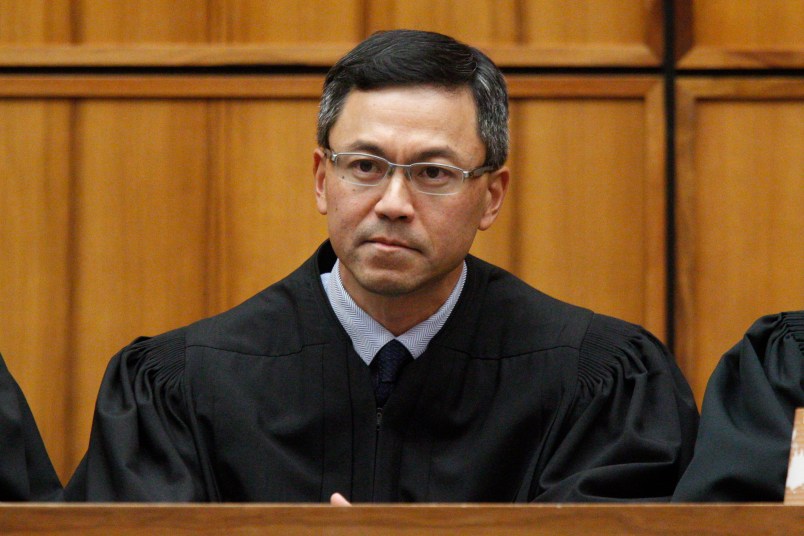HONOLULU (AP) — In another setback for President Donald Trump, a federal judge in Hawaii further weakened the already-diluted travel ban by vastly expanding the list of U.S. family relationships that visitors from six Muslim-majority countries can use to get into the country.
Attorney General Jeff Sessions said Friday that the administration will appeal the ruling to the U.S. Supreme Court, choosing to bypass the San Francisco-based appeals court that has ruled against it and go back to the high court. The justices allowed a scaled-back version of the travel ban to take effect last month and set arguments for October.
The move is the latest volley in the fierce fight over the ban Trump first tried to put in place in January.
The rules are not so much an outright ban as a tightening of tough visa policies affecting citizens from Syria, Sudan, Somalia, Libya, Iran and Yemen. People from those countries who already have visas will be allowed into the U.S.
Only narrow categories of people, including those with relatives named in the ruling, will be considered for new visas. U.S. District Judge Derrick Watson ordered the government not to enforce the ban on grandparents, grandchildren, brothers-in-law, sisters-in-law, aunts, uncles, nieces, nephews and cousins of people in the U.S.
“Common sense, for instance, dictates that close family members be defined to include grandparents,” Watson said in his ruling. “Indeed grandparents are the epitome of close family members.”
Watson also ruled that the government may not exclude refugees who have formal assurance and promise of placement services from a resettlement agency in the U.S.
The ruling could bring relief to more than 24,000 refugees who had already been vetted and approved by the United States, resettlement agencies said.
“Many of them had already sold all of their belongings to start their new lives in safety,” said Becca Heller, director of the International Refugee Assistance Project. “This decision gives back hope to so many who would otherwise be stranded indefinitely.”
White House homeland security adviser Tom Bossert told reporters that Trump administration lawyers will closely review the ruling, but it appears broad enough to “cover every refugee.”
Bossert said he does not believe that was the interpretation the U.S. Supreme Court intended when it reinstated the travel ban against those without a “bona fide relationship” with a person or an entity in the U.S.
The justices didn’t define a bona fide relationship but said it could include a close relative, a job offer or admission to a college or university. A relationship created to avoid the ban would not be acceptable, they said.
The Trump administration defined it as those who had a parent, spouse, fiance, son, daughter, son-in-law, daughter-in-law or sibling already in the U.S.
The case came back to Watson when the 9th U.S. Circuit Court of Appeals ruled that he had the authority to interpret the Supreme Court’s order and block any violation of it. He broadened the definition of what counts as a close relationship.
Hawaii Attorney General Douglas S. Chin, who filed the case for the broader definition, said the court made clear “that the U.S. government may not ignore the scope of the partial travel ban as it sees fit.”
“Family members have been separated and real people have suffered enough,” Chin said in a statement.
Trump has said the policy is a necessary tool for national security and fighting terrorism. His initial travel ban in January set off massive protests at airports nationwide and sparked a sprawling legal fight.
Courts blocked the first ban and the administration’s revised version until the Supreme Court weighed in.
It’s unclear how significantly the new rules have affected or will affect travel. In most of the countries singled out, few people have the means for leisure travel. Those that do already face intensive screenings before receiving visas.







And meanwhile
Two points of interest:
In the 175 days since Trump came to office and signed the first of two immigration orders, both of which have been blocked by the courts, not one terrorist incident perpetrated by an immigrant from any of the seven blocked countries has occurred in the U.S.
Despite Trump’s claims that DHS and immigration officials needed the initial 90 days to develop improved vetting standards there has been absolutely no evidence of any effort much less any progress in that direction by anyone in the Administration, even though they have now had nearly six months to do so.
Clearly the executive orders by our whack-job “President” are a total fraud!
Totally agree with you, but of course Trump will claim that the reason there have been no terrorist incidents from those countries is because the terrorists are afraid of him. He’ll use it to further is unconstitutional agenda and will convince his clueless base that he’s the reason for there being no attacks.
It’s like the old story about “dinosaur bane”. A man is spreading a weird purple powder all over his land when a neighbor asks what it is. He explains that it’s dinosaur bane; you know, to keep dinosaurs away. The neighbor notes that there are no dinosaurs anywhere around. The man says, “It works pretty darn well, don’t it”.
THIS!
Keep government out of the free expression of religion.